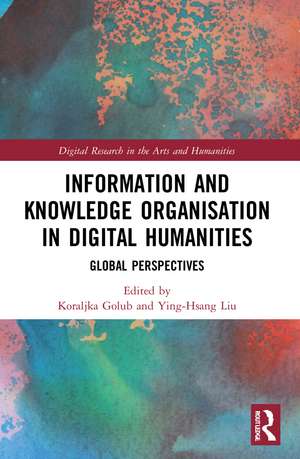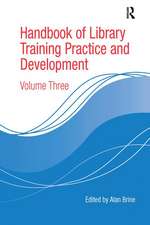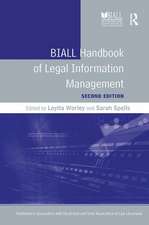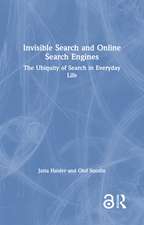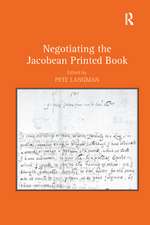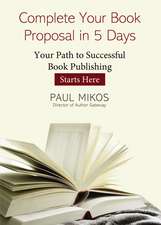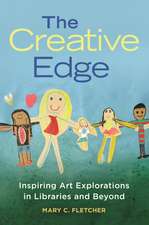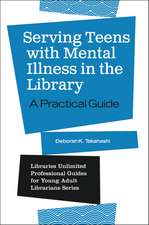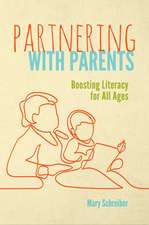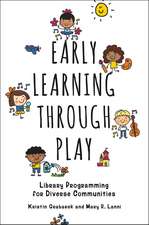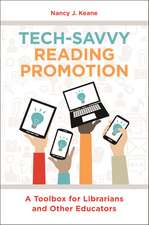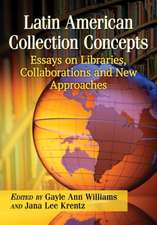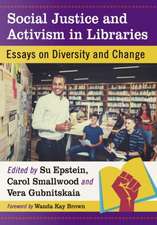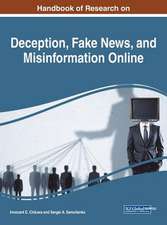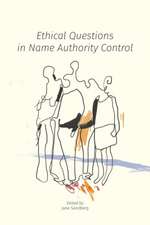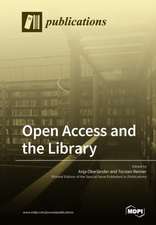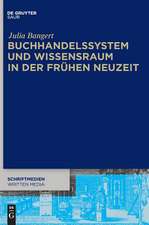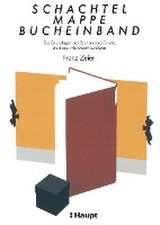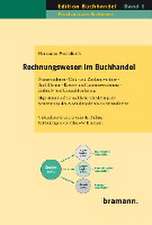Information and Knowledge Organisation in Digital Humanities: Global Perspectives: Digital Research in the Arts and Humanities
Editat de Koraljka Golub, Ying-Hsang Liuen Limba Engleză Paperback – 25 sep 2023
Including contributions from Asia, Australia, Europe, North America and the Middle East, the volume explores the potential uses of, and challenges involved in, applying the organisation of information and knowledge in the various areas of Digital Humanities. With a particular focus on the digital worlds of cultural heritage collections, the book also includes chapters that focus on machine learning, knowledge graphs, text analysis, text annotations and network analysis. Other topics covered include: semantic technologies, conceptual schemas and data augmentation, digital scholarly editing, metadata creation, browsing, visualisation and relevance ranking. Most importantly, perhaps, the book provides a starting point for discussions about the impact of information and knowledge organisation and related tools on the methodologies used in the Digital Humanities field.
Information and Knowledge Organisation is intended for use by researchers, students and professionals interested in the role information and knowledge organisation plays in the Digital Humanities. It will be essential reading for those working in library and information science, computer science and across the humanities.
The Open Access version of this book, available at www.taylorfrancis.com, has been made available under a Creative Commons Attribution-Non Commercial-No Derivatives 4.0 license.
| Toate formatele și edițiile | Preț | Express |
|---|---|---|
| Paperback (1) | 311.41 lei 3-5 săpt. | +22.67 lei 7-13 zile |
| Taylor & Francis – 25 sep 2023 | 311.41 lei 3-5 săpt. | +22.67 lei 7-13 zile |
| Hardback (1) | 1006.77 lei 6-8 săpt. | |
| Taylor & Francis – 8 dec 2021 | 1006.77 lei 6-8 săpt. |
Din seria Digital Research in the Arts and Humanities
-
 Preț: 312.09 lei
Preț: 312.09 lei - 20%
 Preț: 947.44 lei
Preț: 947.44 lei -
 Preț: 309.79 lei
Preț: 309.79 lei - 9%
 Preț: 935.99 lei
Preț: 935.99 lei - 20%
 Preț: 247.23 lei
Preț: 247.23 lei -
 Preț: 311.28 lei
Preț: 311.28 lei -
 Preț: 281.45 lei
Preț: 281.45 lei -
 Preț: 312.36 lei
Preț: 312.36 lei - 13%
 Preț: 338.33 lei
Preț: 338.33 lei - 26%
 Preț: 766.31 lei
Preț: 766.31 lei - 18%
 Preț: 1000.27 lei
Preț: 1000.27 lei - 13%
 Preț: 335.37 lei
Preț: 335.37 lei -
 Preț: 460.69 lei
Preț: 460.69 lei - 18%
 Preț: 1003.64 lei
Preț: 1003.64 lei - 22%
 Preț: 324.16 lei
Preț: 324.16 lei - 26%
 Preț: 764.20 lei
Preț: 764.20 lei -
 Preț: 386.77 lei
Preț: 386.77 lei - 20%
 Preț: 1053.91 lei
Preț: 1053.91 lei -
 Preț: 389.38 lei
Preț: 389.38 lei - 26%
 Preț: 819.90 lei
Preț: 819.90 lei -
 Preț: 422.89 lei
Preț: 422.89 lei - 13%
 Preț: 338.33 lei
Preț: 338.33 lei -
 Preț: 389.38 lei
Preț: 389.38 lei -
 Preț: 383.24 lei
Preț: 383.24 lei - 13%
 Preț: 337.84 lei
Preț: 337.84 lei - 13%
 Preț: 311.31 lei
Preț: 311.31 lei -
 Preț: 489.26 lei
Preț: 489.26 lei -
 Preț: 469.34 lei
Preț: 469.34 lei - 18%
 Preț: 1004.55 lei
Preț: 1004.55 lei - 18%
 Preț: 1005.67 lei
Preț: 1005.67 lei - 18%
 Preț: 999.46 lei
Preț: 999.46 lei - 18%
 Preț: 1000.27 lei
Preț: 1000.27 lei -
 Preț: 489.26 lei
Preț: 489.26 lei - 18%
 Preț: 1000.27 lei
Preț: 1000.27 lei - 18%
 Preț: 1058.65 lei
Preț: 1058.65 lei - 18%
 Preț: 1000.27 lei
Preț: 1000.27 lei - 13%
 Preț: 338.33 lei
Preț: 338.33 lei - 26%
 Preț: 878.42 lei
Preț: 878.42 lei - 26%
 Preț: 764.20 lei
Preț: 764.20 lei
Preț: 311.41 lei
Nou
Puncte Express: 467
Preț estimativ în valută:
59.62€ • 61.34$ • 50.25£
59.62€ • 61.34$ • 50.25£
Carte disponibilă
Livrare economică 07-21 februarie
Livrare express 24-30 ianuarie pentru 32.66 lei
Preluare comenzi: 021 569.72.76
Specificații
ISBN-13: 9780367675684
ISBN-10: 0367675684
Pagini: 314
Ilustrații: 6 Tables, black and white; 8 Line drawings, black and white; 6 Halftones, black and white; 14 Illustrations, black and white
Dimensiuni: 156 x 234 x 21 mm
Greutate: 0.45 kg
Ediția:1
Editura: Taylor & Francis
Colecția Routledge
Seria Digital Research in the Arts and Humanities
Locul publicării:Oxford, United Kingdom
ISBN-10: 0367675684
Pagini: 314
Ilustrații: 6 Tables, black and white; 8 Line drawings, black and white; 6 Halftones, black and white; 14 Illustrations, black and white
Dimensiuni: 156 x 234 x 21 mm
Greutate: 0.45 kg
Ediția:1
Editura: Taylor & Francis
Colecția Routledge
Seria Digital Research in the Arts and Humanities
Locul publicării:Oxford, United Kingdom
Public țintă
PostgraduateNotă biografică
Koraljka Golub is a Professor in Information Studies at Linnaeus University in Sweden. Her research focusses on knowledge organisation of digital document collections, especially on subject access.
Ying-Hsang Liu is a Senior Researcher in Information Studies at Oslo Metropolitan University in Norway. His research lies at the intersections of knowledge organisation, interactive information retrieval and human information behaviour.
Ying-Hsang Liu is a Senior Researcher in Information Studies at Oslo Metropolitan University in Norway. His research lies at the intersections of knowledge organisation, interactive information retrieval and human information behaviour.
Cuprins
Foreword; Preface; Chapter 1: Knowledge Organisation for Digital Humanities: An Introduction; PART I. MODELLING AND METADATA; Chapter 2: Modelling Cultural Entities in Diverse Domains for Digital Archives ; Chapter 3: Collection-Level and Item-Level Description in the Digital Environment: Alignment of Conceptual Models IFLA LRM and RiC-CM ; Chapter 4: Linked Open Data and Aggregation Infrastructure in the Cultural Heritage Sector: A Case Study of SOCH, a Linked Data Aggregator for Swedish Open Cultural Heritage; Chapter 5: A Semantic Enrichment Approach to Linking and Enhancing Dunhuang Cultural Heritage Data; Chapter 6: Semantic Metadata Enrichment and Data Augmentation of Small Museum Collections Following the FAIR Principles; Chapter 7: Digital Research, the Legacy of Form and Structure and the ResearchSpace System; PART II. INFORMATION MANAGEMENT; Chapter 8: Research Access to In-copyright Texts in the Humanities; Chapter 9: SKOS as a Key Element for Linking Lexicography to Digital Humanities; Chapter 10: Linked Data Strategies for Conserving Digital Research Outputs: The Shelf Life of Digital Humanities; PART III: PLATFORMS AND TECHNIQUES; Chapter 11: Heritage Metadata: A Digital Periegesis; Chapter 12: Machine Learning Techniques for the Management of Digitised Collections; Chapter 13: Exploring Digital Cultural Heritage through Browsing; Index.
Recenzii
“This book represents a high-level work aimed at researchers and academics in the areas of digital humanities, cultural heritage informatics and information science, as well as professionals in libraries, archives and museums (LAMs), with a focus on the fundamental theories, models and best practices in knowledge organisation. It contains research articles and experiments by authors who have been recognized as experts in the field and are at the forefront of national and international collaborations. Each of the chapters constitutes a unique and innovative contribution. Put together, this monograph represents one of the most important areas of research in this field in the 2020s.” -- Marcia Lei Zeng, Kent State University, USA.
"Over the last two decades, the Digital Humanities has passed its emerging and evolving stages and now rapidly approaches a more advanced and sophisticated realm of its development as a mature and multidisciplinary area of research and practice. At the same time, scholars and practitioners in this new territory need a range of well-established theories, tools and techniques to collect, organise, share, and generate information and knowledge related to their activities and achievements. This book is a timely response to this urgent need at various levels. It provides an informative and insightful vision towards the applicability and transferability of information and knowledge organisation scholarship for the progress of Digital Humanities. Information professionals, students, and scholars across the GLAM sector (Galleries, Libraries, Archives and Museums) will find the book informative and enlightening. Furthermore, it shows how they can collaborate with scholars and practitioners in the Digital Humanities projects and contribute to the further advancement of this area." -- Yazdan Mansourian, School of Information and Communication Studies, Charles Sturt University, Australia.
"This is the first book that addresses the role of information and knowledge organization (IKO) in digital humanities (DH). The book chapters provide snapshots of how information can be organized in various contexts in digital humanities. Organizing cultural heritage collections in digital environments is addressed in topics such as the creation and adoption of conceptual models and metadata standards, the incorporation of linked open data, approaches to enriching metadata, and the aggregation and interoperability of metadata across cultural heritage collections. Several chapters were devoted to managing digital humanities resources for preservation and reuse, and examples of semi-automated and automated approaches to supporting knowledge organization for improved access, discovery and navigation of digital humanities materials. These diverse topics are discussed from the international perspectives. The book may inspire the researchers of the two fields (IKO and DH) to study knowledge organization methods for processing digital humanities materials and humanities-driven knowledge organization approaches, and may also encourage the collaboration of the researchers in the two fields. The book may also be useful to information professionals in managing digital humanities resources." ~ Yejun Wu, Associate Professor, School of Library and Information Science, Louisiana State University, USA.
”This volume comes as an extremely timely contribution to bridge the gap between knowledge organisation and digital humanities fields. Their points of convergence are very apparent but still - especially considering that information studies, the home discipline of knowledge organisation, has been increasingly active in digital humanities community - there has been little comprehensive work to bring the two together in dialogue. Golub and Liu's volume takes an important step to this direction by lining up a highly international and diverse collection of chapters shedding light to major contexts where knowledge organisation plays a crucial role in and for digital humanities research and vice versa.” ~ Professor Isto Huvila, Department of ALM, Uppsala University, Sweden.
"Over the last two decades, the Digital Humanities has passed its emerging and evolving stages and now rapidly approaches a more advanced and sophisticated realm of its development as a mature and multidisciplinary area of research and practice. At the same time, scholars and practitioners in this new territory need a range of well-established theories, tools and techniques to collect, organise, share, and generate information and knowledge related to their activities and achievements. This book is a timely response to this urgent need at various levels. It provides an informative and insightful vision towards the applicability and transferability of information and knowledge organisation scholarship for the progress of Digital Humanities. Information professionals, students, and scholars across the GLAM sector (Galleries, Libraries, Archives and Museums) will find the book informative and enlightening. Furthermore, it shows how they can collaborate with scholars and practitioners in the Digital Humanities projects and contribute to the further advancement of this area." -- Yazdan Mansourian, School of Information and Communication Studies, Charles Sturt University, Australia.
"This is the first book that addresses the role of information and knowledge organization (IKO) in digital humanities (DH). The book chapters provide snapshots of how information can be organized in various contexts in digital humanities. Organizing cultural heritage collections in digital environments is addressed in topics such as the creation and adoption of conceptual models and metadata standards, the incorporation of linked open data, approaches to enriching metadata, and the aggregation and interoperability of metadata across cultural heritage collections. Several chapters were devoted to managing digital humanities resources for preservation and reuse, and examples of semi-automated and automated approaches to supporting knowledge organization for improved access, discovery and navigation of digital humanities materials. These diverse topics are discussed from the international perspectives. The book may inspire the researchers of the two fields (IKO and DH) to study knowledge organization methods for processing digital humanities materials and humanities-driven knowledge organization approaches, and may also encourage the collaboration of the researchers in the two fields. The book may also be useful to information professionals in managing digital humanities resources." ~ Yejun Wu, Associate Professor, School of Library and Information Science, Louisiana State University, USA.
”This volume comes as an extremely timely contribution to bridge the gap between knowledge organisation and digital humanities fields. Their points of convergence are very apparent but still - especially considering that information studies, the home discipline of knowledge organisation, has been increasingly active in digital humanities community - there has been little comprehensive work to bring the two together in dialogue. Golub and Liu's volume takes an important step to this direction by lining up a highly international and diverse collection of chapters shedding light to major contexts where knowledge organisation plays a crucial role in and for digital humanities research and vice versa.” ~ Professor Isto Huvila, Department of ALM, Uppsala University, Sweden.
Descriere
Information and Knowledge Organisation explores the role of knowledge organisation in the digital humanities. By focusing on how information is described, represented and organised in both research and practice, this work furthers the transdisciplinary nature of digital humanities.
